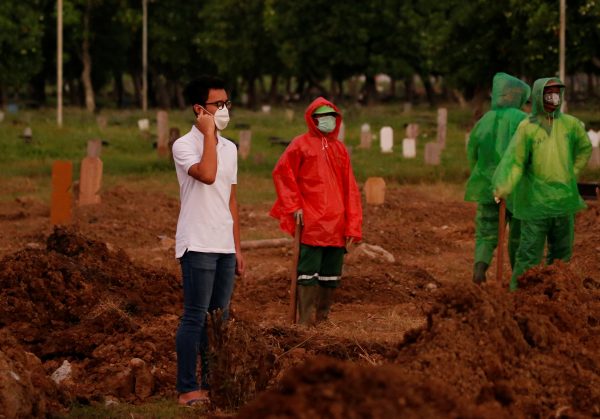Middle powers are not generally prime movers in major international shifts, tending, rather, to react to changes wrought by others. But this is no reason for policy stasis.
The Australian government is right in thinking in the short term about its Pacific neighbours and East Timor. As the major regional power, Australia has a moral obligation and a strategic interest in assisting these countries.
But Australia would be mistaken to focus its resources solely in the immediate neighbourhood at the expense of Southeast Asia — above all, Indonesia — claiming that domestic imperatives preclude help.
During the 1997 Asian financial crisis, then prime minister John Howard provided AU$1 billion in standby credits to Indonesia. After the 2004 tsunami, he also decided that Australia should provide an AU$1billion recovery package to Indonesia.
Howard was right — the stability of Southeast Asia, especially Indonesia, is a paramount Australian national interest.
Indonesia is now facing a crisis of the same dimension as those of 1997 and 2004. Australia should respond with the same farsightedness and seek to have others — particularly Japan, South Korea and the United States — act similarly.
Undoubtedly, there will be little appetite in the Australian government for such actions in Southeast Asia.
But even if Australia were to commit an additional AU$4 billion (US$2.5 billion) to both the South Pacific and Southeast Asia over the next two years in grants and soft loans, this would still be about less than 2 per cent of what it has committed domestically to counter COVID-19. In real terms, it is equivalent to the sum of its two earlier emergency commitments to Indonesia alone. If the current government, like Howard, were to explain its reasoning in terms of the Australian national interest, it is a fair bet that Australians would accept it.
Looking to the medium term, there is a human tendency in times of crisis to see everything as changing. It is not necessarily so. Global trade and investment must continue. Military tensions will persist in Europe and the South China Sea. International institutions will not vanish. People will continue to worry about climate change.
But the adages that history accelerates in times of crisis have validity. US soft power, already squandered under US President Donald Trump, has ebbed ferociously in recent weeks. The divisions between China and the United States have deepened.
The global trend towards nationalism has intensified and the relevance of international institutions is increasingly questioned. In particular, the G7 and G20 leaders have failed to step up in response to the pandemic.
Australia must recognise, not just intellectually but emotionally, that its US security shield is not enough.
US resilience has been underestimated in the past, and it could be again. Still, Australia has to think seriously beyond its security blanket of a dominant US presence in the region and more towards collaborative regional approaches to balance China. This is no easy task given the different interests of the main players and the internal dynamics of some of them, such as India. But Australia has to make that adjustment in its strategic thinking.
Weak multilateral structures are not a reason to avoid multilateralism. COVID-19 should not be allowed to further weaken multilateral institutions, but must rather stimulate efforts to repair them.
While Australians rightly decry the sclerotic nature of many multilateral institutions, they should remember that small and middle powers need rules more than big ones. In particular, Australia needs a good trading system. Australia should work where it has the most influence, namely with like-minded democracies and regional friends, to repair the authority of global and regional institutions and better serve the post-COVID-19 world.
Few serious thinkers risk forecasting where COVID-19 will leave us in the longer term — say a decade hence. As former Chinese premier Zhou Enlai is inaccurately alleged to have said on the impact of the French Revolution: ‘it is too early to tell’.
When the Soviet Union collapsed, the world did not see the rise of Putin. The pundits did not guess that the global financial crisis presaged Trump or Brexit. Americans did not imagine that nearly 20 years after 9/11, their troops would still be in Iraq and Afghanistan.
The COVID-19 crisis will have its own unique chain reaction, probably a massive one. The world will be different. If Australia is to deal with the coming global changes effectively, its leadership will have to put the same policy grunt, political energy and resources into its international dealings as into its domestic challenges.
John McCarthy AO served as Australian ambassador to the United States, Indonesia, Japan, Thailand, Vietnam and Mexico and as high commissioner to India. He is a former president of the Australian Institute of International Affairs.
This article is part of an EAF special feature series on the novel coronavirus crisis and its impact.
A version of this post originally appeared here on John Menadue – Pearls and Irritations.


Although the author raises some important points he suffers the Australian inability to see Asia, South, East and North for what it is in terms of reassertion itself as the dominant economic and political region of the world. He needs to look at Australia’s geographical position in that mix, and also the trade and other economic statistics. The US is the intruder in this region and 400 military bases do not broadcast benign intent.
The current Covid crisis should be seized upon as a golden opportunity to finally shed the US alliance. The author’s false view of the Iraq and Afghanistan wars (and the unwelcome and illegal US presence in Syria) are symptomatic of the US’s real intentions, something the author steadfastly ignores.
There is a narrow window of opportunity for Australia to rectify the profound errors of the past. It cannot rely on the delusional views of the past to continue much longer.